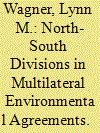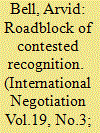| Srl | Item |
| 1 |
ID:
112072


|
|
|
|
|
| Publication |
2012.
|
| Summary/Abstract |
This article responds to the critique of our work offered by Paul Dixon in this issue of Political Quarterly. We correct the numerous inaccuracies and straightforward errors in his work, which, in our view, distort and misrepresent our arguments.
|
|
|
|
|
|
|
|
|
|
|
|
|
|
|
|
| 2 |
ID:
077809


|
|
|
|
|
| Publication |
2007.
|
| Summary/Abstract |
This article analyzes negotiations in the United Nations Commission on Sustainable Development, the Framework Convention on Climate Change, and the Convention to Combat Desertification and focuses on discussions related to technology transfers from the North to the South. These transfers and the financial flows that the private sector could bring with it are closely related to what was believed to be a bargain reached in 1992 at the Rio Earth Summit. During subsequent negotiations, delegates from developed and developing countries have followed a fairly predictable 'script' on these issues - developed countries generally insist that the private sector, as the owner of the technology, must be involved in its transfer, while developing countries have insisted the governments of developed countries should honor their past commitments and promote these transfers. This study describes the development of the script under the three negotiating bodies at Rio, examines the variables that have contributed to the development of the script and, based on this analysis, identifies opportunities to move the talks forward
|
|
|
|
|
|
|
|
|
|
|
|
|
|
|
|
| 3 |
ID:
135248


|
|
|
|
|
| Summary/Abstract |
Resistance to negotiation and the continuation of violence dictate the course of events in the Afghanistan conflict. However, several studies have thoroughly explored the interests of the main parties to the conflict and a settlement that respects their key demands is possible. The current military situation resembles a “hurting stalemate,” which according to rationalist assumptions should compel the parties to move toward negotiations. This article argues that the main obstacle to negotiation is an underlying and unaddressed conflict of recognition between the United States, the Afghan government, and the Taliban. While each party believes it is driven by justice claims, they perceive their opponents to be driven by a hostile strategy informed by incompatible interests. Relying on the Cultural Theory of International Relations, this article explores the parties’ motives in the conflict, focusing on the need to strive for esteem and honor. It suggests that the reciprocal acknowledgement of legitimate identity-related justice claims could remove a key obstacle to formal negotiation.
|
|
|
|
|
|
|
|
|
|
|
|
|
|
|
|